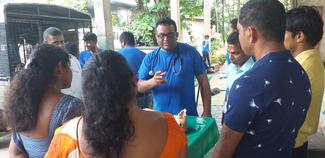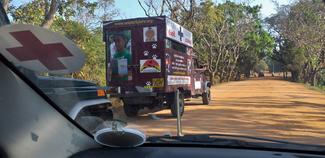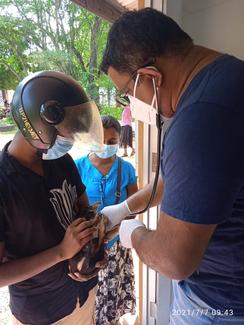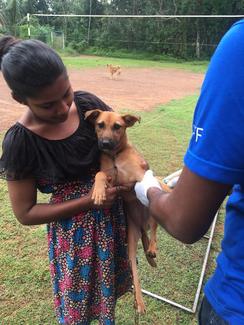
Description of our work
We have been conducting onsite treatments, vaccinations and sterilizations since 2002 and in year 2006 we co-founded the National Rabies Eradication and Humane population control program together with an animal welfare organization and presented it to the then Minister of Health. Together, we started the pilot project for the National Rabies Eradication and humane Animal population control program and after seeing it's success the Ministry of Health started it as the National program for Eradication of Rabies and humane population control ,in the year 2008.
We have trained around 130 veterinary surgeons at our outreach programs, 300 veterinary assistants, dog handlers, vaccinators and more than 70 vaccinators in government institutes. Today these trained personnel are working in many outreach programs ,clinics not only in Sri Lanka but also in some other countries like USA and Australia.
Since 2001 we have conducted more than 1000+ awareness programs around the Island about Rabies Eradication and the importance of spaying/ Neutering and it's impact on Eradication of Rabies. We have been to Schools, Sunday Schools, public events and even distributed leaflets, printed story books which explain the rabies Facts. We also conducted several awareness programs to heads of institutes to explain them specially about facts like herd immunity.
We have been to every district in Sri Lanka with an outreach program in our mobile theater and were able to provide our service and do awareness programs. We distributed 100,000 leaflets about the Rabies Facts Island-wide and we printed the leaflets in both Sinhal and Tamil language.
During this 20 years of service I have personally conducted 93,000 sterilizations and as Vets For Future team we have sterilized 1 million Dogs and Cats and vaccinated around 1.3 million animals against rabies.
We are conducting a Poya Day outreach program selecting rural areas in the country and we put forward a percentage from our salary every month for that.
The ministry of health appointed our organization as the Emergency team for Eradication of rabies and population control as it was a top priority to keep what we achieved by working hard through many years. When we started it was over 60 human death by rabies and now it has come down in to 20-30.
Impact in numbers
- In 20 years of service, I have personally conducted 93,000 sterilizations and as Vets For Future team we have sterilized 1 million Dogs and Cats and vaccinated around 1.3 million animals against rabies.
- I have planned 10 pilot projects for Rabies Eradication and Population Control in 10 different areas and do the projects together with municipal councils and welfare organizations in Sri Lanka.
- We have trained around 130 veterinary surgeons at our outreach programs, 300 veterinary assistants, dog handlers, vaccinators
- Since 2001 we have conducted more than 1000+ awareness programs around the Island
- We printed and distributed 100'000 leaflets in different languages.
Impact (description)
We co-founded the National Rabies Eradication and Humane Animal population control program in 2006 and since then there is a large and considerable reduction of Rabies bites and deaths. We receive so many requests from government sector as well as from welfare groups to work together with the, to share my knowledge and experiences with them to bring the rate up to 0 rabies deaths milestone.
Now my team is conducting daily outreach programs in Sabaragamuwa province, Anuradhapura district, Moratuwa Municipal Council, Galle District and every day we notice the reduction of the number of stray dogs to be sterilized and also reduction of rabies cases.
When we started there were few people who liked to adopt a stray dog or a cat but when we visited there areas a few times and did awareness programs we could built a trust in them and they started adopting puppies, kittens and even grownup dogs directly from our outreach program sites.
And as an encouragement we did all kind of treatments and surgeries, and the drug cost was sponsored by our own organization. People felt more confident and trusted the cause as we issued a vaccination record book to each animal after vaccinating.
Even we organized many adoption Days, adoption stalls at local markets, public places and mobile adoption vehicle was one of our specialties. We always brought vaccinated, sterilized puppies and kittens to the adoption days and handed over them to new families with their vaccination record books.
It was so unfortunate that in past many people were so reluctant to adopt female dogs or cats and even refuse to make friends with them as they were scared that they will give birth to puppies inside their garden, especially in rural areas. So unsterilized, unfriendly female dogs were everywhere, and it wasn't an easy task to gain their trust or to catch them for vaccination or sterilization. But after the National Rabies Eradication and sterilization program, outreach programs carrying out by other organizations and by adoption programs now many people adopt female dogs.
Share a personal experience
In year 2000, after my graduation i was given a task to do research about the paths open for Veterinary Surgeons in the country. Sri Lanka has only one veterinary faculty for the country, and it generates less than 100 vets per year. They wanted me to find out how the veterinary surgeon is going to contribute towards country’s development. I referred many books, articles and also studied about the veterinarians’ role they played in several other countries, and I referred to the statistics of our country as well. So, I was learnt the different methods many other countries followed to reduce the dog population and rabies cases. How they carried out continues vaccination and awareness programs together with sterilization programs.
That knowledge and facts inspired me to believe that Rabies is something can be eradicated by properly attending to the root cause and it's possible to be done in Sri Lanka by initiating a proper plan. My research was published on newspapers as well.
Partners
- Ministry of Health - Sri Lanka 2008 - 2021(present) Public Veterinary health services (present )
- Central Province - Provincial Health Department 2008-2017 Eastern Province - Provincial Health Department 2009-2016 Western province - provincial health department 2009 -2016 Wayamba province - provincial health department 2010-2016 Kandy municipal council 2001 - 2021
- Anuradhapura Municipal Council -2016-2021 Rathnapura municipal council2009-2021 Moratuwa Municipal Council 2020-2021 University of Sabaragamuwa 2010-2021
- Sri Lanka ports authority 2020 Galle municipal council 2009-2021
*All information supplied by nominee*



